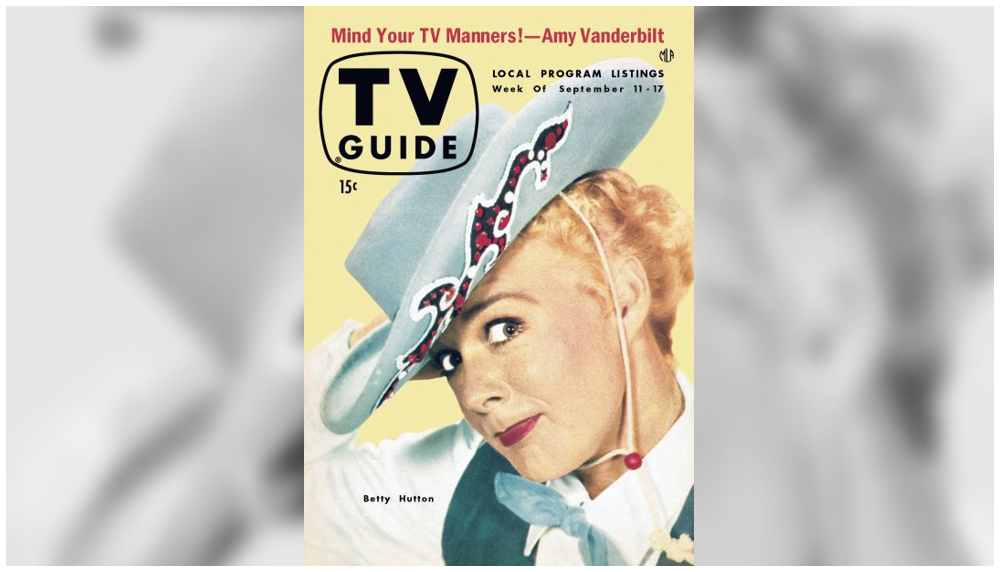Some of you might have been wondering, after my comments last week about my boss and her charm—or lack thereof—whether or not there would be any repercussions. I'm happy to say that there were not, so far, although I'm not surprised, since—as I told you then—something as gauche as classic television operates outside her sphere of influence. Of course, if it were to come to her attention, I'd have to deny any of it ever happened, and blame one or more of you for hacking into the website in an effort to get me into trouble. It won't happen, though, so I don't want any of you to worry about it, but it's always a good idea to have a backup plan, or, as some people see it, an excuse. In any event, if I start asking for money next week, you'll know I miscalculated.
 So who takes the honors as Miss America 1955, and will we have heard of her? Yes! The winner is 19-year-old Lee Ann Meriwether, surely one of the most popular and successful post-pageant winners ever. In fact, the very next night she'll be one of the guests on What's My Line?, hosted by none other than John Daly. Her resume is long and impressive, so I'll sum it up thusly: The Today Show, The Time Tunnel, The Batman Movie (in which she played Catwoman), and Barnaby Jones. There's much more, of course, but that ain't bad.
So who takes the honors as Miss America 1955, and will we have heard of her? Yes! The winner is 19-year-old Lee Ann Meriwether, surely one of the most popular and successful post-pageant winners ever. In fact, the very next night she'll be one of the guests on What's My Line?, hosted by none other than John Daly. Her resume is long and impressive, so I'll sum it up thusly: The Today Show, The Time Tunnel, The Batman Movie (in which she played Catwoman), and Barnaby Jones. There's much more, of course, but that ain't bad.*Fun fact: Bob Russell is credited with having created the 1961 game show Yours for a Song, which was hosted by: Bert Parks! It began in primetime before moving to ABC's daytime lineup, where it was replaced in 1963 by a new soap opera called: General Hospital! Yes, we got a lot out of this one, didn't we?
Miss America is presented in living black-and-white, but the discussion about color broadcasting is growing. This week's As We See It points out that NBC and CBS are increasing the use of color in their spectaculars, but there's one problem: no color programming during the day, when stores are open and the public is shopping. This might sound odd to contemporary ears, but remember: stories didn't used to stay open in the evenings; at most, they might be open one night a week. And since most women do the shopping, and most women don't work, there's no problem! We can debate this another day, but the point Merrill Panitt is making is sound: why spend a bundle of bucks on a color set when you can't go to a store and see one in operation? "Perhaps," Panitt speculates, "the networks hope that dealers will stay open until 9 or 10 o'clock at night and that folks are curious enough about color to visit showrooms after dinner." So far, though, there's no evidence that such curiosity exists.
In the meantime, though, a couple of those color spectaculars make their debut this week. On Sunday at 6:30 p.m., NBC presents the first of impresario Max Liebman's live monthly specials, Satins and Spurs, an original musical comedy by Jay Livingston and Ray Evans, starring Broadway and movie star (and this week's cover girl) Betty Hutton (Annie Get Your Gun) in her television debut. The revues are mixed, causing Hutton to temporarily retire, but you can judge for yourself in this black-and-white kinescope that's of remarkably good quality. Meanwhile, Livingston and Evans have better luck with one of their later works—the theme for Bonanza.
On Wednesday night, CBS comes back with a color special of its own, on the monthly program Best of Broadway. (9:00 p.m.) It's the George S. Kaufman—Edna Ferber comedy "The Royal Family," recounting "the life and times of America's number one family of the theater," with an all-star cast including Charles Coburn, Claudette Colbert, Helen Hayes, Frederic Marsh, and Nancy Olson.
l l l
Let's stay with this week's programming for another minute, for a couple of series premieres. They may be in black and white, but I think you'll agree that they're fairly significant in the classic TV lexicon.
Monday at 8:00 p.m., NBC debuts Medic, the new medical drama starring Richard Boone as Dr. Konrad Styner, narrator and occasional star of the series. Medic is generally considered the first "realistic" medical show, one that concentrated on illness and procedure as opposed to the personal lives and loves of doctors and nurses (like, say, General Hospital)—hardly a surprise since the show was created by James Moser, frequent writer for Dragnet. Even though it only lasts a couple of seasons in first-run, it's a regular in syndication for many years, and sets the standard for a different kind of medical drama. NBC's ad boldly announces "no compromise with truth."
And on Sunday, it's the debut of one of the longest-running and most-loved series of all time, Lassie (6:00 p.m., CBS). Lassie's fame didn't start with television; there had been seven feature films between 1943 and 1951, the first of which, Lassie Come Home, starred Elizabeth Taylor and Roddy McDowell, which means you weren't likely to forget about it; and so by 1954, the collie was a well-known commodity. His companion for the first few seasons, starting tonight, is eleven-year-old Jeff Miller (Tommy Rettig), and the adventures will continue until the final episode, on March 24, 1973.
l l l
How many times has this happened to you: you and your family are gathered in the living room, watching your favorite television program, when all of a sudden the doorbell rings. You look out the window, and it's Brad and Carol, the couple down the street. You sigh; they're nice enough, but they never know when to go home, and you've been waiting all week to watch this show. You'd pause the disc, or maybe just record the end of the show and watch it later, but neither the DVD nor the DVR have been invented yet, and that drives you even crazier. What do you do? What do you do?
It's obvious that television has introduced a whole new aspect to home etiquette, with all kinds of ramifications accordingly. Good thing we've got Amy Vanderbilt, author of Amy Vanderbilt's Complete Book of Etiquette, on hand to answer all your questions.
For instance, to answer your first question, you're not obligated to turn off the TV just because you have uninvited guests. Amy says, "The hostess, taking the initiative, may say: 'We were just watching a program we enjoy very much. Would you like to join us? Or would you prefer to chat with me in the next room until it's over?'" This is not only courteous, it has the added benefit of giving your guests the hint that they're not welcome while the television is on. You also determine to never turn your TV off again. (Actually, I added that last part for comic relief.) Miss Vanderbilt's suggestion is far preferable to my own; I used to tell people to get the hell out and call first the next time. It may help explain why I've gone through life with so few friends.
Among other things, the mistress of etiquette says that if you're a guest in someone's home while they're watching TV, you should watch the program quietly, or, if you came on an errand, finish it as quickly as possible and then leave. If someone calls you while you're watching a favorite show, it's not rude to ask your caller if you can call back after the show's done. If you've planned to have guests over to watch TV but they'd rather do something else, you should feel free to suggest that they come on another evening--gently, of course. And respect your children's wishes if there's a conflict over what to watch. That doesn't mean you should let them control the dial, but it does mean you should respect their own favorites, and try to work out a compromise.
If, on the other hand, you happen to be a guest on someone's TV show, you should not try to upstage the host by dressing inappropriately or trying to top the star's jokes And above all, don't act as if you're doing the host a favor by appearing on their show, even if you are. Remember who the host is, especially if you hope to get a return invitation sometime. Yes, it seems, even celebrities have to follow the rules of etiquette.
l l l
After that lighthearted interlude, we should be able to stomach a slightly more serious special, airing Monday at 7:00 p.m. on NBC. It's the Project Twenty documentary "Three, Two, One—Zero," exploring "the impact of the Atomic Age on the human race." Remember, and this is the part that really hits home for me when I think about it, this documentary airs only nine years after the dropping of the bomb in Japan. This isn't a look back; it's contemporary.
The show covers the history of the atom, and how many atomic scientists are, ironically, driven out of Germany due to Hitler's racial policies. We see the successful test on July 16, 1945, and the two uses in Hiroshima and Nagasaki. We look at Klaus Fuchs and the Rosenbergs, and how the Soviet Union develops and explodes its own bomb. The race continues, climaxing with the first test of the hydrogen bomb. The program ends with a prayer by Stephen Vincent Benet.
The show is produced by Henry Solomon Jr., who did Victory at Sea, with narration by Project Twenty veteran Alexander Scourby and music from Robert Russell Bennett. The description of the program takes up an entire column in the issue.
l l l
You know, there aren't really any new ideas. I used to enjoy watching the British version of Whose Line Is It Anyway? hosted by Clive Anderson. It was an improv fan's delight, watching stars doing skits based on audience suggestions. It was imported to the United States, where Drew Carey hosted a version that featured many of the same improv stars as the original.
Well, it turns out that in 1954 there's another British import that's made its way to the American airwaves, specifically DuMont: One Minute, Please, and while it isn't exactly the same thing, it speaks a similar language. As Frank DeBlois explains in "Program of the Week," One Minute, Please, features a host (John K. M. McCaffery) and a panel (British comedienne Hermoine Gingold, joined by such American luminaries as Cleveland Amory, Marc Connelly, and Ernie Kovacs), who are tasked with talking for a full minute nonstop on "some impossible subject." "This sounds easy," DeBlois says, "but actually—as those who have appeared on the program will avow—it's often tough."
The subjects have included such scintillating topics as "Why I Wear Sneakers," "The Perfect Woman," "Whale Blubber," and "Zebras." DeBlois is right: as someone who used to compete in speech contests and worked for a company that trained executives in proper speaking techniques, 60 seconds is a lot longer than you think. (Try counting to 60 sometime, and you'll see how time seems to expand.) And once you've talked for a half-minute on something like "How to Make Glue," horrified contests will discover they're only halfway through. DeBlois's verdict: "Although none of this fare will leave you gasping, some of it—particularly when Miss Gingold is activating that wonderful face—is quietly amusing. It rates more than one minute, please, of your time."
l l l
And in next week's issue of TV Guide, available on newsstands now:
Don't go there. Just. . . don't. TV









On your comments about your boss, I had to reread that part last week, as I thought at first you were saying ARLENE FRANCIS lacked charm & grace, and I wondered why you'd say that.
ReplyDeleteI first read about SATINS AND SPURS in a 1980 book by Bart Andrews called THE WORST TV SHOWS OF ALL TIME. He didn't think it was as bad as a lot of the other shows in his book, from what I could tell. He also mentioned that the special ran 7 minutes short, so Steve Allen gave a tour of the new (at the time) NBC Brooklyn studios for the remaining time.
ONE MINUTE PLEASE reminds me a bit of a "game" show called IT PAYS TO BE IGNORANT, which came out of the 1950s and involved 3 celebrities trying to stay off-topic for a set amount of time. I never saw the 1950s version, but I remember a new 1970s version that featured Charles Nelson Reilly, JoAnne Worley, and an Englishman named Billy Baxter. Joe Flynn hosted the show shortly before his deat, which I'm sure gave him a great opportunity to show off his great slow burn, especially when Mr. Baxter said weekly (or more often) "I have a poem, Mr. Flynn".
*deat=death (oops!)
Delete